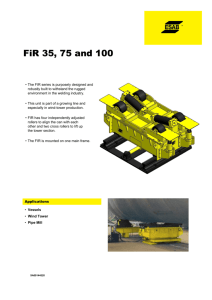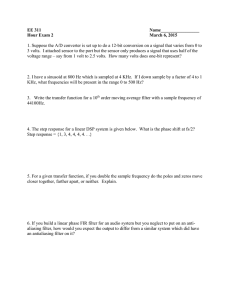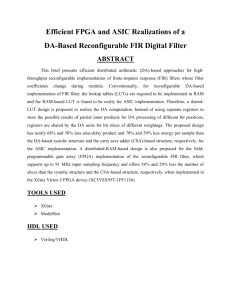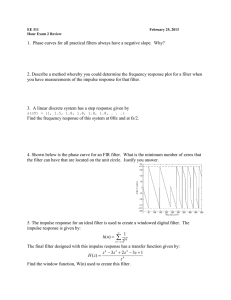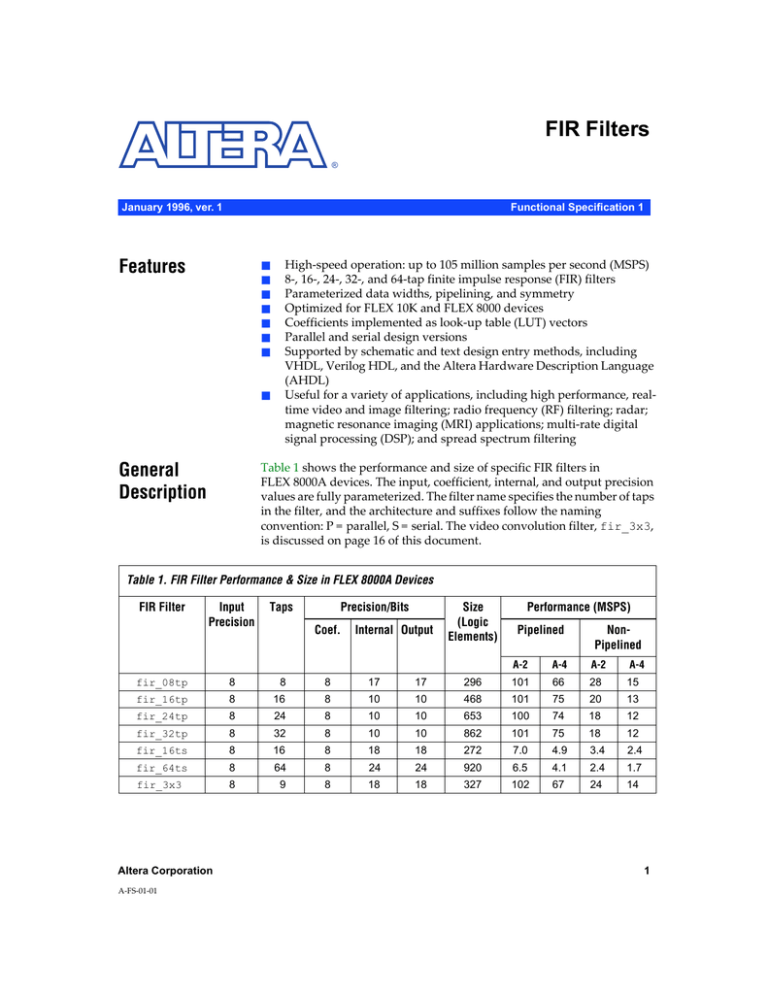
FIR Filters
®
January 1996, ver. 1
Functional Specification 1
Features
■
■
■
■
■
■
■
■
General
Description
High-speed operation: up to 105 million samples per second (MSPS)
8-, 16-, 24-, 32-, and 64-tap finite impulse response (FIR) filters
Parameterized data widths, pipelining, and symmetry
Optimized for FLEX 10K and FLEX 8000 devices
Coefficients implemented as look-up table (LUT) vectors
Parallel and serial design versions
Supported by schematic and text design entry methods, including
VHDL, Verilog HDL, and the Altera Hardware Description Language
(AHDL)
Useful for a variety of applications, including high performance, realtime video and image filtering; radio frequency (RF) filtering; radar;
magnetic resonance imaging (MRI) applications; multi-rate digital
signal processing (DSP); and spread spectrum filtering
Table 1 shows the performance and size of specific FIR filters in
FLEX 8000A devices. The input, coefficient, internal, and output precision
values are fully parameterized. The filter name specifies the number of taps
in the filter, and the architecture and suffixes follow the naming
convention: P = parallel, S = serial. The video convolution filter, fir_3x3,
is discussed on page 16 of this document.
Table 1. FIR Filter Performance & Size in FLEX 8000A Devices
FIR Filter
Input
Precision
Taps
8
8
fir_08tp
Precision/Bits
Coef.
8
Internal Output
17
17
Size
(Logic
Elements)
296
Performance (MSPS)
Pipelined
NonPipelined
A-2
A-4
A-2
A-4
101
66
28
15
fir_16tp
8
16
8
10
10
468
101
75
20
13
fir_24tp
8
24
8
10
10
653
100
74
18
12
fir_32tp
8
32
8
10
10
862
101
75
18
12
fir_16ts
8
16
8
18
18
272
7.0
4.9
3.4
2.4
fir_64ts
8
64
8
24
24
920
6.5
4.1
2.4
1.7
fir_3x3
8
9
8
18
18
327
102
67
24
14
Altera Corporation
A-FS-01-01
1
FS 1: FIR Filters
Adding more taps to the filter does not significantly change the
speed for any given precision width. See Figure 1.
Figure 1. Speed for 8-Bit Input Filters in FLEX 8000A Devices
120
Parallel Filters
100
80
Speed (MSPS)
60
40
20
Serial Filters
0
0
8
16
24
32
64
Taps
Altera’s FIR filters provide the designer with a great deal of
flexibility because they can be customized for specialized
applications by modifying the source code. In addition, the filters’
flexibility allows designers to implement decimating or
interpolating filters, and to use the vector multiplier from these
reference designs to implement any operation that has multiply and
accumulate (MACs) functions, where one set of multiplicands is
constant.
All linear-phase FIR filters have symmetric coefficients; therefore,
the designer can take advantage of this symmetry by adding taps
prior to multiplication. For example, an 8-tap FIR filter can be
implemented with a 4-input vector multiplier. The vector multiplier
performs the following multiplication: y = (h(1) × s(1)) + (h(2) × s(2))
+ (h(3) × s(3)) + (h(4) × s(4)), where h(n) are FIR coefficients, and s(n)
are pre-added data samples. The coefficients must be fixed prior to
compilation, although you can change the coefficients by
reconfiguring the device. Thus, it is possible to change the filter
function in response to user controls. The device can be reconfigured
in less than 100 ms. To be implemented in FLEX devices, all FIR
filters require MAX+PLUS II version 6.0 or higher.
f
2
See Application Note 73 (Implementing FIR Filters in FLEX Devices) for
a complete description of vector multipliers and the FIR filter
architecture.
Altera Corporation
FS 1: FIR Filters
Parameters
The following FIR filter parameters can be defined by the user:
■
■
■
■
■
■
■
Data Width (width)—The width (in bits) of incoming data.
Coefficient Precision (rom_p)—The width of the coefficients used
for the FIR filter, independent of the data width setting.
Internal Precision (internal_p)—The precision (in bits) of
internal calculations in the FIR filter.
Output Precision (output_p)—The precision (in bits) of the
output data. This value can be different from the internal
precision.
Pipelined/Non-Pipelined Design (pipelined)—When designers
choose between a fully pipelined or non-pipelined design, the
main filter design program, FIRGEN, creates the coef.inc file
accordingly. A fully pipelined design results in the maximum
operating frequency with no extra device area usage.
Symmetrical/Antisymmetrical Filters ("sym" or "anti")—
Designers can specify whether the filter is symmetric or
antisymmetric. Symmetrical FIR filters implement even
functions with symmetric tap adders. Designers can create an
antisymmetric FIR filter that implements an odd function by
using symmetric tap subtractors. FIRGEN allows the designer to
specify symmetrical or antisymmetrical coefficients.
Coefficients—FIRGEN automatically generates an AHDL
Include File (coef.inc) that specifies vector table representations
of filter coefficients. Designers specify the original file
containing coefficients to FIRGEN, which then computes the
vector tables and adds them to coef.inc. Although the
coefficients are specified at compilation, they are not parameters
because they are defined by constants in the coef.inc file. If more
than one filter exists in the design, modify a copy of the top-level
Text Design File (.tdf) file (e.g., fir_08tp.tdf) and change the
name of the Include File (coef.inc).
Parameters vs. Ports
Parameters, which are variables established at design time,
determine the configuration of the filter. Parameters cannot be
changed once the filter has been designed and is operating in-circuit.
In contrast, ports refer to the in-circuit I/O ports, including the I/O
data, Clock, and Reset.
Altera Corporation
3
FS 1: FIR Filters
Design Flow
Overview
The 8-tap parallel FIR filter design flow in Figure 2 is common to all
FIR filter reference designs supplied with the Altera DSP Design Kit.
The designer can specify the filter requirements using any
commercially available FIR filter design software that can store the
coefficients in an ASCII file. This file should contain the filter
coefficients one-per-line and should have the extension .dat.
The listing below shows the coefficients for an 8-tap lowpass filter in
the lp8.dat file, available from the Altera DSP Design Kit:
-5.144663E-03
-2.279553E-02
9.638777E-02
.4296515
.4296515
9.638777E-02
-2.279553E-02
-5.144663E-03
Next, the designer runs FIRGEN to read the coefficients from the
data file. Then, FIRGEN calculates the vector table for the LUT and
creates coef.inc.
Using MAX+PLUS II, the designer can compile the AHDL Include
File and set the parameters for the particular filter. To insure the
smallest size and maximum performance, set the Global Project
Synthesis Style to Fast in the Global Project Logic Synthesis dialog
box. This option uses carry chains for high-speed operation.
FIRGEN also generates a swept sine wave (or chirp signal) Vector
File, called sweep.vec. This file can be used as a simulation source
file for the MAX+PLUS II Simulator to generate the filter’s frequency
response. The response is then viewed with any plotting program,
such as Microsoft Excel or Gnuplot, a freely distributed program
included with the Altera DSP Design Kit.
1
4
For a sample design, see the FIR Filter Design Walkthrough in
the readme file on the Altera DSP Design Kit CD-ROM.
Altera Corporation
FS 1: FIR Filters
Figure 2. FIR Filter Design Flow
FIR Filter
Design Software
ASCII file
(<file name>.dat)
sweep.vec
FIRGEN
fir_08tp.tdf
coef.inc
MAX+PLUS II
Compiler
FLEX 10K or
FLEX 8000 Device
MAX+PLUS II
Simulator
sweep.tbl
FIRGEN
sweep.out
Plotting
Program
Altera Corporation
5
FS 1: FIR Filters
Instantiation
The designer can compile a FIR filter as a stand-alone design or can
insert an instance of a FIR filter in a design. The filter function is
placed and connected in the MAX+PLUS II Graphic Editor, an
AHDL TDF, a third-party Verilog HDL file, or a VHDL file. Figure 3
shows an instance of an 8-tap FIR filter in a Graphic Design File
(.gdf).
Figure 3. 8-Tap Filter in a GDF
INTERNAL_P = 17
OUTPUT_P = 17
PIPELINED = "YES"
ROM_P = 8
WIDTH = 8
SYM = "SYM"
FIR_08TP
XIN[8..1]
CLK
ACLR
XIN[WIDTH..1]
CLK
Y[OUTPUT_P..1]
Y[17..1]
ACLR
Figure 4 shows an instance of an 8-tap FIR filter implemented in an
AHDL TDF.
6
Altera Corporation
FS 1: FIR Filters
Figure 4. 8-Tap Filter in an AHDL TDF
INCLUDE "fir_08tp"
CONSTANT INPUT_WIDTH = 8;
CONSTANT COEFFICIENT_P = 8;
CONSTANT OUTPUT_P = 17;
CONSTANT INTERNAL_P = 15;
CONSTANT SYM = "sym"
SUBDESIGN test_tdf
(
xin[width..1]
clk
aclr
y[output_p..1]
)
:INPUT;
:INPUT;
:INPUT;
:OUTPUT
VARIABLE
fir : fir_08tp WITH
(
width = input_width,
rom_p = coefficient_p,
output_p = output_p,
pipelined = "YES"
internal_p = internal_p
sym = "sym"
);
BEGIN
fir.xin[] = xin[];
fir.aclr = aclr;
fir.clk = clk;
y[] = fir.y[];
END;
Altera Corporation
7
fir_08tp, fir_16tp, fir_24tp, fir_32tp & fir_64tp
Parallel FIR Filters
Features
■
■
■
■
■
General
Description
Altera parallel FIR filters are linear-phase designs with operation speeds
of over 100 MSPS. By efficiently using the Altera FLEX architecture, these
filters provide extremely fast, flexible, and cost-effective design solutions.
The coefficients are stored in LUTs and their values are determined at
compilation; however, the coefficients can be changed by reconfiguring
the device.
Parallel FIR filter reference designs
High-speed operation: > 100 MSPS
Parameterized data widths, pipelining, and symmetry
Symmetrical or antisymmetrical coefficients
Parallel design versions for maximum performance
Figure 5 shows the symbol for the 8-tap parallel FIR filter. All other
parallel FIR filters in the Altera DSP Design Kit have the same symbol.
Coefficients are defined in an Include File (.inc) called coef.inc.
Figure 5. 8-Tap Parallel FIR Filter Symbol
INTERNAL_P =
OUTPUT_P =
PIPELINED =
ROM_P =
WIDTH =
FIR_08TP
XIN[WIDTH..1]
CLK
Y[OUTPUT_P..1]
ACLR
Function Prototype
The AHDL Function Prototype for the fir_08tp function is shown
below and is the same for all other parallel FIR filters in the Altera DSP
Design Kit:
FUNCTION fir_08tp (xin[width..1] clk, aclr)
WITH (width, rom_p, internal_p, output_p, pipelined)
RETURNS (y[output_p..1]);
Altera Corporation
8
FS 1: FIR Filters
Parameters
Parameters for the parallel FIR filter functions are provided in
Table 2. In the default value of the output_p parameter, the
constant BLOCKS refers to the number of 8-tap blocks in the filter.
Table 2. Parallel FIR Filter Parameters
Name
Default
Value
Description
width
8
Integer
Input word width (in bits)
rom_p
8
Integer
Coefficient precision
pipelined
"yes"
"yes" or "no"
Pipelined/non-pipelined
sym
"sym"
"sym" or "anti"
Symmetrical/antisymmetrical
output_p
width+blocks+rom_p
Integer
Output precision (in bits)
internal_p
output_p
Integer
Internal precision (in bits)
Ports
Input and output ports for the parallel FIR filter functions are
provided in Table 3.
Table 3. Input & Output Ports
Port Type
Name
Description
Input
xin[width..1]
Data input
Input
clk
Clock input
Input
aclr
Asynchronous Clear
Output
y[output_p..1]
Data output
Block Diagrams
Figures 6 through 9 show block diagrams for the fir_08tp,
fir_16tp, fir_24tp, and fir_32tp filters.
f
Altera Corporation
See Application Note 73 (Implementing FIR Filters in FLEX Devices) for
more information on how to implement vector multipliers.
9
FS 1: FIR Filters
Figure 6. FIR_08TP Filter Block Diagram
w = width
xin[width..1]
w
w+1
s(1)
C(1)
w+1
w+1
s(2)
C(2)
s(3)
w+1
s(4)
C(3)
C(4)
Parallel Vector Multiplier
y[output_p..1]
10
Altera Corporation
FS 1: FIR Filters
Figure 7. FIR_16TP Filter Block Diagram
xin[width..1]
w
w
w
8-Tap Filter
Block
8-Tap Filter
Block
w
w
y[output_p..1]
Figure 8. FIR_24TP Filter Block Diagram
xin[width..1]
w
w
8-Tap Filter
Block
w
w
8-Tap Filter
Block
w
w
8-Tap Filter
Block
w
8-Tap Filter
Block
w
y[output_p..1]
Figure 9. FIR_32TP Filter Block Diagram
xin[width..1]
w
w
w
w
8-Tap Filter
Block
w
8-Tap Filter
Block
w
w
8-Tap Filter
Block
w
y[output_p..1]
Altera Corporation
11
fir_16ts & fir_64ts
Serial FIR Filters
Features
■
■
■
■
■
General
Description
The Altera serial FIR filters are small, linear-phase designs with operation
speeds of over 6 MSPS. By efficiently using the Altera FLEX architecture,
these filters provide extremely fast, flexible, and cost-effective design
solutions. In addition, the filters use bit-serial computation, making them
significantly smaller than parallel implementations. The filters are
implemented using the vector-multiplier approach described in
Application Note 73 (Implementing FIR Filters in FLEX Devices). The
coefficients are stored in LUTs and their values are determined at
compilation; however, the coefficients can be changed by reconfiguring
the device. Other tap lengths are available by modifying a copy of the
AHDL TDF. These designs convert parallel data input into serial internal
data for processing. Thus, each input sample must be applied to the input
(xin) for width + 1 clock cycles.
Serial FIR filter reference designs
Serial implementation for minimum resource usage
High performance: > 6 MSPS
Parameterized data widths, pipelining, and symmetry
Symmetrical or antisymmetrical coefficients
Figure 10 shows the symbol for the 16-tap serial FIR filter. All other serial
FIR filters in the Altera DSP Design Kit have the same symbol.
Coefficients are defined in an Include File (.inc) called coef.inc.
Figure 10. Serial FIR Filter Symbol
WIDTH =
PIPELINED =
SYM =
ROM_P =
OUTPUT_P =
FIR_16TS
XIN[WIDTH..1]
CLK
Y[OUTPUT_P..1]
ACLR
Altera Corporation
12
FS 1: FIR Filters
Function Prototype
The AHDL Function Prototype for the fir_16ts function is shown
below and is the same for all other serial FIR filters in the Altera DSP
Design Kit:
FUNCTION fir_16ts (xin[width..1] clk, aclr)
WITH (width, pipelined, sym, rom_p, output_p)
RETURNS (y[output_p..1]);
Parameters
Parameters for the serial FIR filter functions are provided in Table 4.
In the default value for the output_p parameter, the constant
blocks refers to the number of 8-tap blocks in the filter.
Table 4. Serial FIR Filter Parameters
Name
Default
Value
Description
width
8
Integers
Input word width (in bits)
rom_p
8
Integers
Coefficient precision
pipelined
"yes"
"yes" or "no"
Pipelined/non-pipelined
sym
"sym"
"sym" or "anti"
Symmetrical/antisymmetrical
output_p
width+blocks+rom_p
Integers
Output precision (in bits)
Ports
Input and output ports for the serial FIR filter functions are provided
in Table 5.
Table 5. Input & Output Ports
Port Type
Altera Corporation
Name
Description
Input
xin[width..1]
Data input
Input
clk
Clock input
Input
aclr
Asynchronous Clear
Output
y[output_p..1]
Data output
13
FS 1: FIR Filters
Block Diagrams
Figures 11 and 12 show block diagrams for the fir_16ts and
fir_64ts FIR filters.
Figure 11. FIR_16TS Filter Block Diagram
8-Tap Serial FIR Filter Block
xin[width..1]
Parallelto-Serial
Shift
Register
1
n+1
Shift
Register
n+1
Shift
Register
n+1
Shift
Register
n+1
Shift
Register
n+1
Shift
Register
n+1
Shift
Register
n+1
Shift
Register
n+1
Shift
Register
Serial Adder
plsr_load
CIN
COUT
Serial
Adder
D
Q
SUM
CLR
Serial
Adder
SUM
CLR
Serial
Adder
SUM
8-Tap
Serial FIR
Filter Block
CLR
CLR
8 × 16
LUT
rom_p
carry_clr
plsr_load
accum_clr
Scaling
Accumulator
add_sub
Control
Block
latch_result
Result
Register
y[output_p..1]
14
Altera Corporation
FS 1: FIR Filters
Figure 12. FIR_64TS Filter Block Diagram
xin[width..1]
Parallel-to-Serial
Shift Register
8-Tap
Serial
FIR
Filter
Block
8
8
8-Tap
Serial
FIR
Filter
Block
8
8
8-Tap
Serial
FIR
Filter
Block
8
8
8-Tap
Serial
FIR
Filter
Block
8
8
8-Tap
Serial
FIR
Filter
Block
8
8
8-Tap
Serial
FIR
Filter
Block
8
8
8-Tap
Serial
FIR
Filter
Block
8
carry_clear
plsr_load
Control
Block
accum_load
latch_output
Scaling
Accumulator
Result
Register
y[output_p..1]
Altera Corporation
15
fir_3x3
Symmetrical Video FIR Filter
Features
■
■
■
■
General
Description
The Altera fir_3x3 symmetrical video FIR filter is a linear-phase design
with an operation speed of over 100 MSPS. By efficiently using the Altera
FLEX architecture, this filter provides an extremely fast, flexible, and costeffective convolution operation. These filters are implemented with the
vector-multiplier approach described in Application Note 73 (Implementing
FIR Filters in FLEX Devices). The coefficients are stored in LUTs and their
values are determined at compilation; however, the coefficients can be
changed by reconfiguring the device.
Symmetrical video FIR filter reference design
High performance: > 100 MSPS
Parallel implementation for maximum performance
Parameterized data widths and symmetry
Figure 13 shows the symbol for the fir_3x3 symmetrical video FIR filter.
Figure 13. FIR_3x3 Video Filter Symbol
WIDTH =
ROM_P =
OUTPUT_P =
INTERNAL_P =
PIPELINED =
FIR_3x3
XIN[3..1][WIDTH..1]
CLK
Y[OUTPUT_P..1]
ACLR
Function Prototype
The AHDL Function Prototype for the fir_3x3 function is shown below:
FUNCTION fir_3x3 (xin[3..1][width..1], clk, aclr)
WITH (width, rom_p, output_p, internal_p,
pipelined)
RETURNS (y[output_p..1]);
Altera Corporation
16
FS 1: FIR Filters
Parameters
Parameters for the fir_3x3 function design are provided in
Table 6.
Table 6. fir_3x3 Parameters
Name
Default
Value
Description
width
8
Integers
Input word width (in bits)
rom_p
8
Integers
Coefficient precision
pipelined
"yes"
"yes" or "no"
Symmetrical/antisymmetrical
output_p
width+2+rom_p
Integers
Output precision (in bits)
internal_p
= output_p
= output_p
Pipelined/non-pipelined
Ports
Input and output ports for the fir_3x3 function are provided in
Table 7.
Table 7. Input & Output Ports
Port Type
Name
Description
Input
xin[3..1][8..1]
Data input
Input
clk
Clock input
Input
aclr
Asynchronous Clear
Output
y[output_p..1]
Data output
Block Diagram
Figure 14 shows the block diagram of the fir_3x3 video filter. One
input to the vector multiplier is zero and the other three inputs are
the sums of the symmetric taps. The n-bit value from pixel 1 is
stuffed with two leading zeroes so that all inputs to the parallel
vector multiplier are n + 2 bits wide.
Altera Corporation
17
FS 1: FIR Filters
Figure 14. FIR_3x3 Video Filter Block Diagram
xin[3][width..1]
3
2
3
1
2
w
xin[2][width..1]
2
w
xin[1][width..1]
3
2
3
GND
w+2
w+2
w+2
w+2
Parallel
Vector
Multiplier
y[output..1]
18
Altera Corporation
FS 1: FIR Filters
®
2610 Orchard Parkway
San Jose, CA 95134-2020
(408) 894-7000
Applications Hotline:
(800) 800-EPLD
Customer Marketing:
(408) 894-7104
Literature Services:
(408) 894-7144
20
Altera, MAX, MAX+PLUS, and FLEX are registered trademarks of Altera Corporation. The following are
trademarks of Altera Corporation: MAX+PLUS II, AHDL, and FLEX 10K. Altera acknowledges the
trademarks of other organizations for their respective products or services mentioned in this document,
specifically: Verilog and Verilog-XL are registered trademarks of Cadence Design Systems, Inc. Mentor
Graphics is a registered trademark of Mentor Graphics Corporation. Synopsys is a registered trademark of
Synopsys, Inc. Viewlogic is a registered trademark of Viewlogic Systems, Inc. Altera products are protected
under numerous U.S. and foreign patents and pending applications, maskwork rights, and copyrights. Altera
warrants performance of its semiconductor products to current specifications in accordance with Altera’s
standard warranty, but reserves the right to make changes to any products and services at any time without
notice. Altera assumes no responsibility or liability arising out of the application or use of
any information, product, or service described herein except as expressly agreed to in
writing by Altera Corporation. Altera customers are advised to obtain the latest version of
device specifications before relying on any published information and before placing
orders for products or services.
Copyright 1996 Altera Corporation. All rights reserved.
Altera Corporation
Printed on Recycled Paper.


